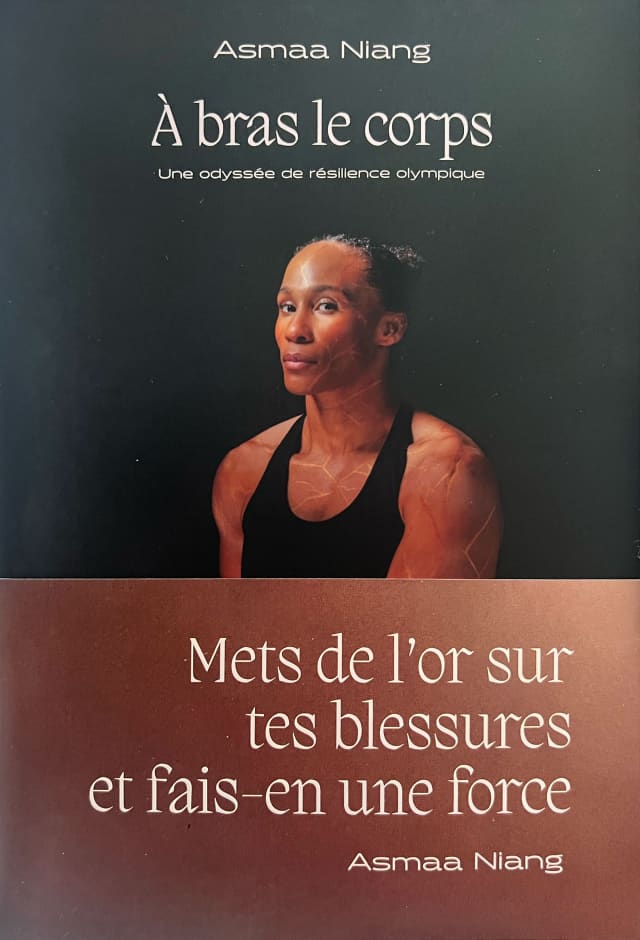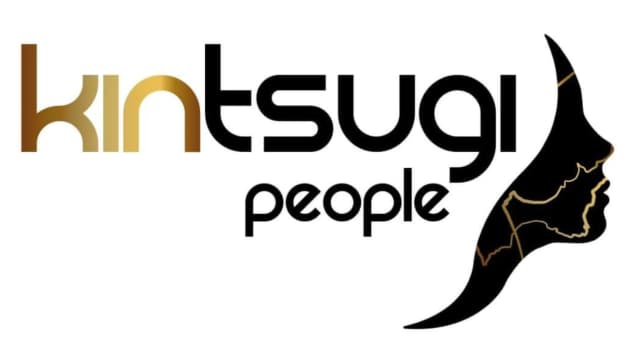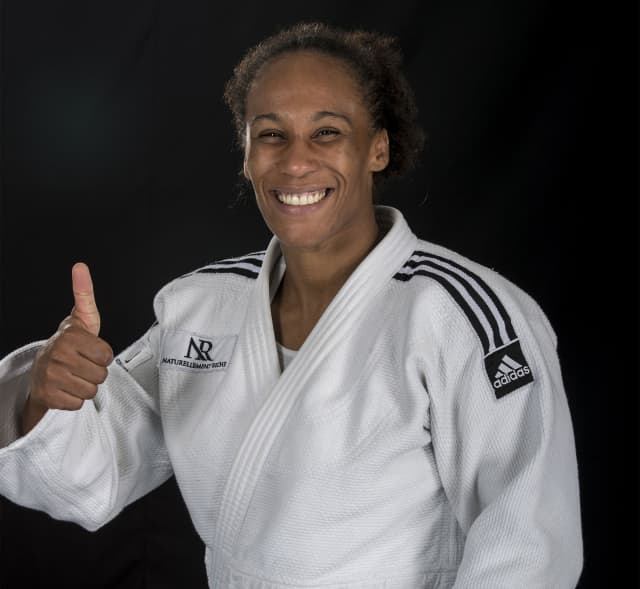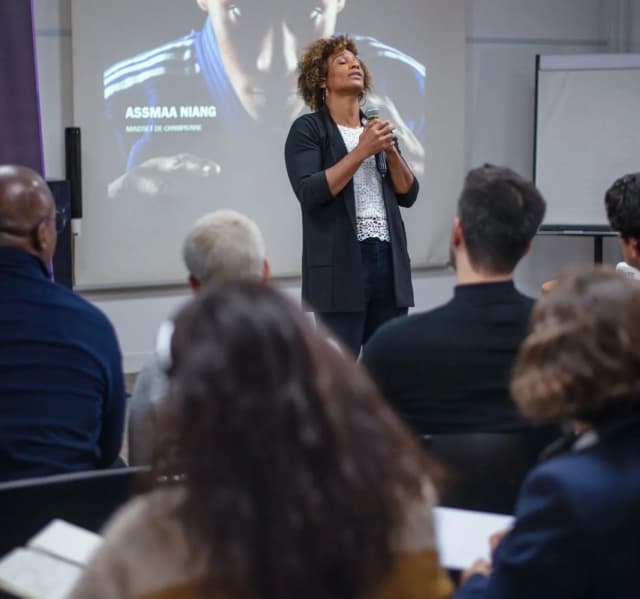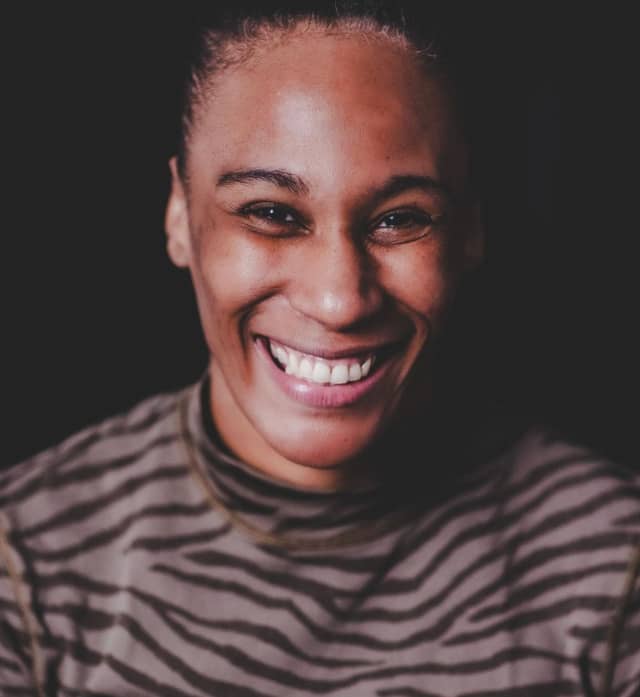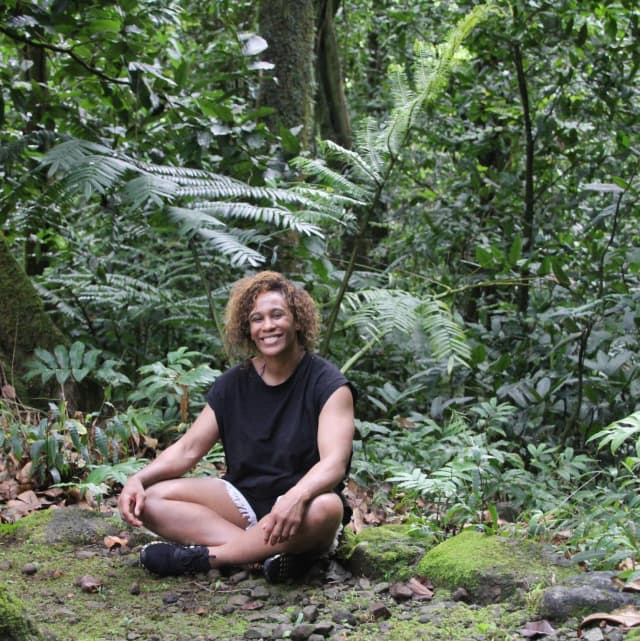"The desire to write has always been in me. I deeply love transmission and I have an immense passion for reading, which has allowed me to elevate myself throughout my life. I had powerful messages to leave and I wanted to push everyone to reflect. So I included twelve chapters with strong messages, tools, as well as a selection of books to read, films and documentaries to watch to deepen the reflection process.
I feel like this project has always been in me. It comes as a continuation of my journey, but one thing at a time, I needed all this experience before putting my ideas in writing. In the end, it's still a dream come true."
On the cover of her book, Asmaa talks about putting gold on her wounds to make them a strength. Behind this, there is a strong concept. "Ah, Kintsugi! In fact, I have always been fascinated by human potential, always fascinated by resilient processes. I was already wondering at a very young age why some people are resilient and others are not. All this questioning brought me back to my life project, where sport plays an important role.
Judo is a sport of resilience; we first learn to fall to learn how to do judo without getting injured. I discovered Kintsugi during a trip to Japan. This art therapy consists of not throwing away a broken object but repairing it and sublimating it with gold, which makes it even more precious. It spoke to me so much that I opened my organisation, Kintsugi-People, where I support women and men to sublimate their ailments and to see them as a beautiful force.
I speak to any individual who wants to develop their full potential, to each human who wants to reveal themselves and free themselves from limiting beliefs. I sincerely hope that readers can find positive inspiration through this book, because that is its main goal. I also hope that the references to other books will encourage people to focus on their own projects, and when I say ‘their own projects,’ I mean self-development because I am convinced that everything begins with inner energy. Our eyes reflect the world like a mirror."
Judo plays a very important part in Asmaa's life. It wasn't always the case but there is a common thread that underpins everything she has undertaken. "To tell the truth, I have always dreamed of the Olympic Games, since I was little; it was my ultimate dream. I embodied this dream. At first I wanted to run in the 100 metre final (laughs).
I only encountered judo when I was 20 years old. I entered a dojo for the first time in my life and put on a judogi. A coach was impressed by my physical abilities. He told me that I could go far in this sport. At that moment, I saw the giant Olympic rings in front of me and I promised myself that one day I would be an Olympic athlete and that I would be among the best in the world. I made an exceptional decision at the age of 29: to leave for Morocco to reach the international level. It was a crazy bet but I managed to keep my promise."
This relatively late discovery of judo did not prevent Asmaa from appreciating its values. "What has always guided me was centered on this notion that in judo everything is possible. I have the impression that it is a sport where if you work hard, you can achieve a lot. Over time, I understood that judo brought me more than medals but rather, self-knowledge. For me, judo has been the best therapy."
Arriving at the end of her high-level career, Asmaa is not bitter, hence her big smile in Abu Dhabi. "You know, I've always had a dual project. I've never lived solely from judo, I've always needed to work to be financially comfortable; I've always worked on the side, whether as a firefighter for ten years or in other professional projects. So, the end of my sports career is not really an end for me. I will remain a high-level athlete forever. I will no longer compete on the World Judo Tour but I continue my life as before, except for competitions. I am an eternal sportswoman and I continue to train intensely because I love it. I don't know this notion of an end. I will always be driven by the athletes I train. I want to help them develop their full potential.
Today my projects are focused on support. I am a therapist but also a mental trainer, speaker and now an author. I think I will write another book in the future. My life mission will always remain in the world of developing human potential. I also want to continue my commitment to Africa, a continent with exceptional human potential that is often untapped due to lack of resources, which touches me deeply.
My high-level career has been the best university bench. I have learned a lot on the field. The challenge of progressing through difficulty has pushed me to find solutions on my own, while developing many skills. When I accompany other high-level athletes, I often remind them that it is legitimate to want to be the best and to train intensely to obtain a medal. However, once you have come down from the podium, if you have not learned anything during this journey, the medal loses its value. The main thing is to make the most of this journey because the real treasure lies in the journey itself. The medal represents a magnificent reward but it should not be an end in itself. I have been able to transform this perspective at my level and I am proud of it."
In her book Asmaa makes several references to the animal world. She speaks about the hermit crab for instance, but also, "I am a zebra with stripes that reflect my multiple origins: African, Moroccan, Senegalese, French, an inestimable richness. As a mixed race person, I feel good everywhere. Of course, I have encountered obstacles during my career. However, in judo, these differences do not really matter; we all wear a blue or white judogi. Although sports can be politicised at times, I have always shown tolerance. Having visited 72 countries, I particularly appreciate an inspiring quote from an often forgotten ancient philosopher. Saint Hugues de Victor said, "He is happy the one for whom the homeland is sweet, he is courageous the one for whom every soil is a homeland, he is perfect the one for whom the whole world is an exile."
It is therefore not surprising to see that Asmaa's African roots are at the heart of her world view. "Africa, the cradle of humanity, mother earth; this continent is fascinating. With 70% of its population under 25, it is a young continent. It has extraordinary human potential, especially in judo. I often feel an inequality because athletes do not prepare properly as in Western countries. There is equality on the mat but no equity in the sense that athletes do not have the same resources. I sincerely believe that if everyone had the same means, Africans would sweep all the medals internationally.
I will try, at my level, to help African judoka, because it is close to my heart. I know that the IJF is also making efforts and I hope that this continent becomes autonomous and trains its own coaches in order to create a synergy and inspiration that allows our athletes to perform here without dreaming of the West, by staying on the continent."
Looking back on her high-level years, Asmaa has a lot to teach us. She is an ambassador of a certain idea of performance. "I sincerely believe that I have always wanted to achieve the impossible in my career. By starting judo at 20, aiming for international competitions at 29 and entering the world top 5, I won all these medals with one goal: to prove that everything is possible. Being an ambassador is an honour. I want to show all young girls that nothing is impossible. I have walked this path and they can all embody what they wish to be in this life. Now I know that it is a beautiful life mission for me to continue to advocate this message through concrete actions.
I am the oldest member of the Moroccan national team, so I position myself as such. I value mutual aid and prosperity and I think that judo is based on these values. I always tell my team that my wish is for an athlete to surpass my record in order to continue to convey this energy within Moroccan judo. Beyond that, judo carries a beautiful philosophy and through high-level athletes, we act as ambassadors to inspire young people to practise this sublime sport.
I would like to encourage my federation to benefit from the experience of former athletes and those who are approaching the end of their careers, by training them to become coaches or to occupy other roles that contribute to the evolution of Moroccan judo. This is the only way to progress, using the strength and experience of our country.
Each chapter of my book has its own specific tools to put in place, because I want to be realistic and concrete. I believe that taking action, regardless of the result, makes us grow. I call it the little courage of each morning, constancy. We could also call it discipline, but whatever it is, it is when we act with confidence and audacity that over time, we are fulfilled."
Asmaa is a fulfilled woman. Even if this fulfillment came at a price, she is now able to take the necessary step back to transmit everything she has learned. "The challenges I encountered began at the age of 29, when I left the Paris Fire Brigade for Morocco to pursue my Olympic dream. I gave up everything for this, with the goal of qualifying among the top 10 in the world. To achieve this, I had to make an exceptional decision and achieve exceptional results. In a high-level career, the word ‘high’ has a deep meaning: my life and my actions had to live up to my ambitions. No matter the field, when you are driven by a passion, your actions must live up to your dreams. I have integrated this daily requirement into my morning routine. Ultimately, the key to all this is the intense love you put into your projects."
From all these years at a high level, as well as everything she has learned in life, Asmaa draws on lessons that she is happy to share with as many people as possible, "I sincerely believe that our first project is ourselves, the development of our being. Ultimately, medals are sublime rewards but they in no way define our value. The opponents are your best allies; thanks to them, we progress. The opponent can be yourself or others. Above all, you must never forget that something is always happening and that you must stay connected to the present moment. High-level judo is a beautiful human adventure. You should never give up on something you love; you have to find love in what you do. I wish every athlete to live a beautiful career to the full while amassing treasures. These are some of the things I have learned and I want to share."
We could spend hours talking with Asmaa, she has learned so much and has so much to teach us. So when you meet her, don't hesitate to ask her questions. She will be happy to answer them and guide you.

